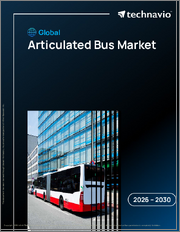
|
시장보고서
상품코드
1755923
팬터그래프식 버스 충전기 시장 예측(-2032년) : 충전기 유형, 설치 유형, 컴포넌트, 차종, 지역별 세계 분석Pantograph Bus Charger Market Forecasts to 2032 - Global Analysis By Charger Type (Standard DC Charger (Up to 150 kW), Fast DC Charger (151-300 kW) and Ultra-Fast DC Charger (Above 300 kW)), Mounting Type, Component, Vehicle Type and By Geography |
||||||
Stratistics MRC에 따르면 세계의 팬터그래프식 버스 충전기 시장은 2025년에 35억 달러를 차지하며 예측 기간 중 CAGR 22.3%로 성장하며, 2032년에는 145억 달러에 달할 전망입니다.
팬터그래프식 버스 충전기는 전기버스에 사용되는 머리 위 전도성 충전 시스템입니다. 버스 충전 레일로 연결되는 루프 마운트 또는 마스트 마운트 암을 통해 고속으로 자동화된 충전을 가능하게 합니다. 터미널이나 버스 정류장에 설치되어 고출력 직류 충전을 지원하여 다운 타임을 줄이고 경로 효율성을 향상시킵니다. 팬터그래프 시스템은 빠르고 안정적인 충전이 필요한 고빈도 도시 교통 네트워크에 이상적입니다.
버스 차량의 급속한 전동화
환경 문제에 대한 관심이 높아지고 지속가능한 대중 교통에 대한 긴급한 요구로 인해 도시와 교통 기관은 디젤 버스에서 전기버스로의 전환을 추진하고 있습니다. 또한 이러한 전환에는 효율적이고 대용량 충전 솔루션이 필요하며, 이는 팬터그래프 버스 충전기의 채택을 가속화하고 있습니다. 공공 및 민간 이해관계자들이 청정 모빌리티에 투자함에 따라 첨단 충전 인프라에 대한 수요가 지속적으로 증가하여 시장의 견고한 성장을 지원하고 있습니다.
표준화 부족
보편적인 기술 표준이 없기 때문에 서로 다른 시스템 및 제조업체 간의 상호 운용성이 저해되어 차량 운영자에게 운영상의 어려움을 초래하고 있습니다. 또한 이러한 불일치로 인해 사업자는 독자적인 솔루션에 투자해야 하므로 대규모 배포가 복잡해지고 비용이 증가합니다. 그 결과, 시장 도입 속도가 느려지고 통일된 표준이 확립될 때까지 광범위한 전기화의 잠재적 이점이 완전히 실현되지 않을 것입니다.
정부의 강력한 지원과 탈탄소화의 의무화
세계 정책 입안자들은 온실가스 배출을 줄이고 깨끗한 교통수단을 촉진하기 위한 규제와 인센티브를 시행하고 있습니다. 또한 이러한 조치들은 팬터그래프 충전 시스템을 포함한 전기버스 인프라에 대한 투자를 장려하고 있습니다. 도시와 교통기관이 무공해 차량으로의 전환을 우선시하고 충전 네트워크를 현대화함에 따라 공공정책과 환경 목표의 일관성이 시장의 추가 확장을 촉진할 것으로 예측됩니다.
원자재 및 에너지 원료 변동
금속 및 전자 부품과 같은 주요 원자재 공급 및 가격 변동은 제조 비용을 상승시키고 공급망을 혼란에 빠뜨릴 수 있습니다. 또한 예측 불가능한 에너지 가격은 전기버스 충전의 운영 경제성에 영향을 미칠 수 있으며, 팬터그래프 시스템의 경제성 및 채택에 영향을 미칠 수 있습니다. 이러한 불확실성으로 인해 제조업체와 사업자는 시장의 안정성을 보장하기 위해 위험 완화 전략을 실행해야 합니다.
COVID-19의 영향:
COVID-19 팬데믹은 팬터그래프 버스 충전기 시장공급망을 일시적으로 혼란에 빠뜨리고 인프라 프로젝트를 지연시켰습니다. 그러나 팬데믹 이후 지속가능하고 탄력적인 대중교통 시스템에 대한 관심이 높아지면서 전기버스 충전 인프라에 대한 투자가 가속화되고 있으며, 단기적인 침체에도 불구하고 장기적인 시장 성장을 지원하고 있습니다. 정부와 교통 기관이 더 깨끗한 모빌리티 솔루션을 우선시함에 따라 향후 수년간 시장이 회복되고 더욱 확대될 것으로 예측됩니다.
예측 기간 중 급속 DC 충전기(151-300kW) 부문이 가장 큰 시장으로 성장할 것으로 예측됩니다.
급속 DC 충전기(151-300kW) 부문은 급속 충전 기능을 통해 전기버스의 가동 중단 시간을 줄이고 운행 효율성을 높일 수 있으므로 예측 기간 중 가장 큰 시장 점유율을 차지할 것으로 예측됩니다. 또한 교통 기관은 고주파 운행을 지원하고 증가하는 승객 수요에 대응하기 위해 이러한 충전기를 점점 더 선호하고 있으며, 이는 이 부문 시장 리더십을 더욱 공고히 하고 있습니다.
지붕 장착형 팬터그래프(버스) 부문은 예측 기간 중 가장 높은 CAGR을 나타낼 것으로 예측됩니다.
예측 기간 중 지붕 장착형 팬터그래프(버스용) 부문이 가장 높은 성장률을 보일 것으로 예측됩니다. 이러한 성장은 기존 버스 설계에 쉽게 통합할 수 있고, 안전성이 향상되었으며, 신뢰할 수 있는 자동화된 충전 솔루션을 원하는 교통 기관에서 채택이 확대되고 있기 때문입니다. 또한 루프 마운팅 시스템이 제공하는 유연성과 효율성은 도시 차량에 특히 매력적이어서 채택을 가속화하고 시장을 확대하는 원동력이 되고 있습니다.
가장 큰 점유율을 차지하는 지역:
예측 기간 중 아시아태평양은 급속한 도시화, 전기 이동성을 촉진하기 위한 정부의 구상, 대중 교통 인프라에 대한 투자 증가로 인해 가장 큰 시장 점유율을 차지할 것으로 예측됩니다. 또한 중국, 일본, 한국 등의 국가들이 전기버스 보급을 주도하고 충전 인프라를 지원하고 있으며, 이 지역 세계 시장 지배력이 더욱 강화될 것으로 예측됩니다.
CAGR이 가장 높은 지역:
예측 기간 중 유럽은 가장 높은 CAGR을 보일 것으로 예측됩니다. 이는 엄격한 배출 규제, 정부의 강력한 인센티브, 각국의 전기버스 도입 확대에 기인합니다. 또한 유럽 도시들은 지속가능한 대중 교통 솔루션 도입의 최전선에 있으며, 이 지역의 탈탄소화에 대한 적극적인 태도는 팬터그래프 버스 충전기 설치의 급속한 성장을 가속할 것으로 예측됩니다.
무료 커스터마이징 서비스
이 보고서를 구독하는 고객은 다음과 같은 무료 맞춤화 옵션 중 하나를 이용할 수 있습니다.
- 기업소개
- 추가 시장 기업의 종합적인 프로파일링(최대 3사)
- 주요 기업의 SWOT 분석(최대 3사)
- 지역 세분화
- 고객의 관심에 따른 주요 국가별 시장 추정, 예측, CAGR(주: 타당성 확인에 따라 다름)
- 경쟁사 벤치마킹
- 제품 포트폴리오, 지역적 입지, 전략적 제휴를 기반으로 한 주요 기업 벤치마킹
목차
제1장 개요
제2장 서문
- 개요
- 이해관계자
- 조사 범위
- 조사 방법
- 데이터 마이닝
- 데이터 분석
- 데이터 검증
- 조사 어프로치
- 조사 자료
제3장 시장 동향 분석
- 촉진요인
- 억제요인
- 기회
- 위협
- 신흥 시장
- COVID-19의 영향
제4장 Porter's Five Forces 분석
- 공급 기업의 교섭력
- 바이어의 교섭력
- 대체품의 위협
- 신규 진출업체의 위협
- 경쟁 기업 간 경쟁 관계
제5장 세계의 팬터그래프식 버스 충전기 시장 : 충전기 유형별
- 표준 DC 충전기(150kW 미만)
- 급속 DC 충전기(151-300kW)
- 초고속 DC 충전기(300kW 이상)
제6장 세계의 팬터그래프식 버스 충전기 시장 : 설치 유형별
- 지붕 탑재 팬터그래프(버스)
- 가공 마스트 탑재 팬터그래프(고정형)
제7장 세계의 팬터그래프식 버스 충전기 시장 : 컴포넌트별
- 하드웨어
- 소프트웨어와 서비스
제8장 세계의 팬터그래프식 버스 충전기 시장 : 차종별
- 배터리 전기버스(BEV)
- 플러그인 하이브리드 전기버스(PHEV)
제9장 세계의 팬터그래프식 버스 충전기 시장 : 지역별
- 북미
- 미국
- 캐나다
- 멕시코
- 유럽
- 독일
- 영국
- 이탈리아
- 프랑스
- 스페인
- 기타 유럽
- 아시아태평양
- 일본
- 중국
- 인도
- 호주
- 뉴질랜드
- 한국
- 기타 아시아태평양
- 남미
- 아르헨티나
- 브라질
- 칠레
- 기타 남미
- 중동 및 아프리카
- 사우디아라비아
- 아랍에미리트
- 카타르
- 남아프리카공화국
- 기타 중동 및 아프리카
제10장 주요 발전
- 계약, 파트너십, 협업, 조인트 벤처
- 인수와 합병
- 신제품 발매
- 사업 확대
- 기타 주요 전략
제11장 기업 프로파일링
- ABB Ltd.
- Siemens AG
- Schunk Transit Systems GmbH
- Wabtec Corporation
- Vector Informatik GmbH
- SETEC Power
- SCHUNK GmbH & Co. KG
- Valmont Industries, Inc.
- Comeca Group
- Heliox B.V.
- Opbrid SL
- Furrer+Frey AG
- JEMA Energy
- Hitachi Rail
- Schneider Electric SE
- Kempower Oy
According to Stratistics MRC, the Global Pantograph Bus Charger Market is accounted for $3.5 billion in 2025 and is expected to reach $14.5 billion by 2032 growing at a CAGR of 22.3% during the forecast period. A pantograph bus charger is an overhead conductive charging system used for electric buses. It enables fast, automated charging via a roof-mounted or mast-mounted arm that connects to charging rails on the bus. They're installed at terminals or bus stops; they support high-power DC charging, reducing downtime and improving route efficiency. Pantograph systems are ideal for high-frequency urban transit networks requiring rapid and reliable charging.
Market Dynamics:
Driver:
Rapid electrification of bus fleets
Growing environmental concerns and the urgent need for sustainable public transportation are pushing cities and transit authorities to transition from diesel to electric buses. Furthermore, this shift necessitates efficient, high-capacity charging solutions, thereby accelerating the adoption of pantograph bus chargers. As public and private stakeholders invest in cleaner mobility, the demand for advanced charging infrastructure continues to rise, underpinning robust market growth.
Restraint:
Lack of standardization
The absence of universal technical standards hinders interoperability between different systems and manufacturers, creating operational challenges for fleet operators. Moreover, this inconsistency complicates large-scale deployment and increases costs, as operators may need to invest in proprietary solutions. As a result, the pace of market adoption is slowed, and the potential benefits of widespread electrification are not fully realized until harmonized standards are established.
Opportunity:
Strong government support & decarbonization mandates
Policymakers worldwide are implementing regulations and incentives aimed at reducing greenhouse gas emissions and promoting clean transportation. Additionally, these measures encourage investments in electric bus infrastructure, including pantograph charging systems. The alignment of public policy with environmental goals is expected to drive further market expansion, as cities and transit agencies prioritize the transition to zero-emission fleets and modernize their charging networks.
Threat:
Raw material and energy feedstock fluctuations
Volatility in the supply and pricing of key materials, such as metals and electronic components, can increase manufacturing costs and disrupt supply chains. Moreover, unpredictable energy prices may affect the operational economics of electric bus charging, potentially impacting the affordability and adoption of pantograph systems. These uncertainties require manufacturers and operators to implement risk mitigation strategies to ensure market stability.
Covid-19 Impact:
The Covid-19 pandemic temporarily disrupted supply chains and delayed infrastructure projects in the pantograph bus charger market. However, the increased focus on sustainable and resilient public transportation systems post-pandemic has accelerated investments in electric bus charging infrastructure, supporting long-term market growth despite short-term setbacks. As governments and transit agencies prioritize cleaner mobility solutions, the market is expected to recover and expand further in the coming years.
The fast DC charger (151-300 kW) segment is expected to be the largest during the forecast period
The fast DC charger (151-300 kW) segment is expected to account for the largest market share during the forecast period, driven by its ability to provide rapid charging, reducing downtime for electric buses and enhancing operational efficiency. Moreover, transit agencies increasingly prefer these chargers to support high-frequency operations and meet growing passenger demand, further consolidating the segment's leadership in the market.
The roof-mounted pantograph (on bus) segment is expected to have the highest CAGR during the forecast period
Over the forecast period, the roof-mounted pantograph (on bus) segment is predicted to witness the highest growth rate. This growth is attributed to its ease of integration into existing bus designs, improved safety features, and the growing adoption by transit agencies seeking reliable and automated charging solutions. Furthermore, the flexibility and efficiency offered by roof-mounted systems make them particularly attractive for urban fleets, driving their accelerated adoption and market expansion.
Region with largest share:
During the forecast period, the Asia Pacific region is expected to hold the largest market share due to rapid urbanization, government initiatives promoting electric mobility, and increasing investments in public transportation infrastructure. Additionally, countries such as China, Japan, and South Korea are leading the deployment of electric buses and supporting charging infrastructure, further solidifying the region's dominant position in the global market.
Region with highest CAGR:
Over the forecast period, the Europe region is anticipated to exhibit the highest CAGR, driven by stringent emission regulations, strong government incentives, and the growing adoption of electric buses across countries. Moreover, European cities are at the forefront of implementing sustainable public transport solutions, and the region's proactive stance on decarbonization is expected to fuel rapid growth in pantograph bus charger installations.
Key players in the market
Some of the key players in Pantograph Bus Charger Market include ABB Ltd., Siemens AG, Schunk Transit Systems GmbH, Wabtec Corporation, Vector Informatik GmbH, SETEC Power, SCHUNK GmbH & Co. KG, Valmont Industries, Inc., Comeca Group, Heliox B.V., Opbrid SL, Furrer+Frey AG, JEMA Energy, Hitachi Rail, Schneider Electric SE, and Kempower Oy.
Key Developments:
In September 2024, Vector announced that Release 32 of its MICROSAR Classic basic software will fully support the ISO 15118-20 standard. This standard is crucial for the next generation of charging systems, as it includes specifications for use cases like Automatic Connection Device Pantograph (ACDP) charging.
In August 2023, Siemens AG has signed an agreement to acquire Heliox, a Netherlands-based technology leader in fast charging solutions, serving e-Bus and e-Truck fleets and passenger vehicles. The acquisition will complement Siemens' existing eMobility charging portfolio, adding products and solutions for DC fastcharging focused on eBus and eTruck fleets. Heliox's portfolio will also extend Siemens' market reach, primarily in Europe and North America, while improving capabilities in power electronics.
In Mach 2022, ABB announced it is supplying 23 Buy America-compliant chargers for St. Louis's electric bus fleet in the largest deployment for a U.S. transit authority. The project includes three pantograph chargers alongside 20 plug-in depot chargers, providing over 4.35 megawatts (MW) of charging capacity.
Charger Types Covered:
- Standard DC Charger (Up to 150 kW)
- Fast DC Charger (151-300 kW)
- Ultra-Fast DC Charger (Above 300 kW)
Mounting Types Covered:
- Roof-Mounted Pantograph (on bus)
- Overhead Mast-Mounted Pantograph (stationary)
Components Covered:
- Hardware
- Software & Services
Vehicle Types Covered:
- Battery Electric Buses (BEVs)
- Plug-in Hybrid Electric Buses (PHEVs)
Regions Covered:
- North America
- US
- Canada
- Mexico
- Europe
- Germany
- UK
- Italy
- France
- Spain
- Rest of Europe
- Asia Pacific
- Japan
- China
- India
- Australia
- New Zealand
- South Korea
- Rest of Asia Pacific
- South America
- Argentina
- Brazil
- Chile
- Rest of South America
- Middle East & Africa
- Saudi Arabia
- UAE
- Qatar
- South Africa
- Rest of Middle East & Africa
What our report offers:
- Market share assessments for the regional and country-level segments
- Strategic recommendations for the new entrants
- Covers Market data for the years 2024, 2025, 2026, 2028, and 2032
- Market Trends (Drivers, Constraints, Opportunities, Threats, Challenges, Investment Opportunities, and recommendations)
- Strategic recommendations in key business segments based on the market estimations
- Competitive landscaping mapping the key common trends
- Company profiling with detailed strategies, financials, and recent developments
- Supply chain trends mapping the latest technological advancements
Free Customization Offerings:
All the customers of this report will be entitled to receive one of the following free customization options:
- Company Profiling
- Comprehensive profiling of additional market players (up to 3)
- SWOT Analysis of key players (up to 3)
- Regional Segmentation
- Market estimations, Forecasts and CAGR of any prominent country as per the client's interest (Note: Depends on feasibility check)
- Competitive Benchmarking
- Benchmarking of key players based on product portfolio, geographical presence, and strategic alliances
Table of Contents
1 Executive Summary
2 Preface
- 2.1 Abstract
- 2.2 Stake Holders
- 2.3 Research Scope
- 2.4 Research Methodology
- 2.4.1 Data Mining
- 2.4.2 Data Analysis
- 2.4.3 Data Validation
- 2.4.4 Research Approach
- 2.5 Research Sources
- 2.5.1 Primary Research Sources
- 2.5.2 Secondary Research Sources
- 2.5.3 Assumptions
3 Market Trend Analysis
- 3.1 Introduction
- 3.2 Drivers
- 3.3 Restraints
- 3.4 Opportunities
- 3.5 Threats
- 3.6 Emerging Markets
- 3.7 Impact of Covid-19
4 Porters Five Force Analysis
- 4.1 Bargaining power of suppliers
- 4.2 Bargaining power of buyers
- 4.3 Threat of substitutes
- 4.4 Threat of new entrants
- 4.5 Competitive rivalry
5 Global Pantograph Bus Charger Market, By Charger Type
- 5.1 Introduction
- 5.2 Standard DC Charger (Up to 150 kW)
- 5.3 Fast DC Charger (151-300 kW)
- 5.4 Ultra-Fast DC Charger (Above 300 kW)
6 Global Pantograph Bus Charger Market, By Mounting Type
- 6.1 Introduction
- 6.2 Roof-Mounted Pantograph (on bus)
- 6.3 Overhead Mast-Mounted Pantograph (stationary)
7 Global Pantograph Bus Charger Market, By Component
- 7.1 Introduction
- 7.2 Hardware
- 7.3 Software & Services
8 Global Pantograph Bus Charger Market, By Vehicle Type
- 8.1 Introduction
- 8.2 Battery Electric Buses (BEVs)
- 8.3 Plug-in Hybrid Electric Buses (PHEVs)
9 Global Pantograph Bus Charger Market, By Geography
- 9.1 Introduction
- 9.2 North America
- 9.2.1 US
- 9.2.2 Canada
- 9.2.3 Mexico
- 9.3 Europe
- 9.3.1 Germany
- 9.3.2 UK
- 9.3.3 Italy
- 9.3.4 France
- 9.3.5 Spain
- 9.3.6 Rest of Europe
- 9.4 Asia Pacific
- 9.4.1 Japan
- 9.4.2 China
- 9.4.3 India
- 9.4.4 Australia
- 9.4.5 New Zealand
- 9.4.6 South Korea
- 9.4.7 Rest of Asia Pacific
- 9.5 South America
- 9.5.1 Argentina
- 9.5.2 Brazil
- 9.5.3 Chile
- 9.5.4 Rest of South America
- 9.6 Middle East & Africa
- 9.6.1 Saudi Arabia
- 9.6.2 UAE
- 9.6.3 Qatar
- 9.6.4 South Africa
- 9.6.5 Rest of Middle East & Africa
10 Key Developments
- 10.1 Agreements, Partnerships, Collaborations and Joint Ventures
- 10.2 Acquisitions & Mergers
- 10.3 New Product Launch
- 10.4 Expansions
- 10.5 Other Key Strategies
11 Company Profiling
- 11.1 ABB Ltd.
- 11.2 Siemens AG
- 11.3 Schunk Transit Systems GmbH
- 11.4 Wabtec Corporation
- 11.5 Vector Informatik GmbH
- 11.6 SETEC Power
- 11.7 SCHUNK GmbH & Co. KG
- 11.8 Valmont Industries, Inc.
- 11.9 Comeca Group
- 11.10 Heliox B.V.
- 11.11 Opbrid SL
- 11.12 Furrer+Frey AG
- 11.13 JEMA Energy
- 11.14 Hitachi Rail
- 11.15 Schneider Electric SE
- 11.16 Kempower Oy



















